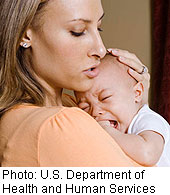
THURSDAY, June 2 (HealthDay News) — A new study finds that a saliva test in newborns can detect almost all cases of a virus that can cause birth defects and hearing loss.
The test could allow doctors to get a head start on preventing or treating deafness in children infected with the virus, known as cytomegalovirus.
The traditional “heel stick” blood test for newborns doesn’t do a good job of detecting the infection, which is passed from mother to child and affects tens of thousands of babies each year, although most don’t suffer any ill effects. The test misses 60 percent to 70 percent of cases.
Cytomegalovirus is “the epidemic that nobody’s ever heard of,” said Dr. Mark Schleiss, director of the University of Minnesota Medical School’s division of pediatric infectious diseases and immunology. “This virus causes more birth defects in babies than any other infectious disease in the United States today.”
In the new study, published in the June 2 issue of the New England Journal of Medicine, researchers at the University of Alabama at Birmingham and colleagues examined mouth swabs taken from almost 35,000 infants from seven U.S. hospitals. They were taken when babies were about a day old.
The researchers tested the samples and confirmed their results using a testing procedure that’s too unwieldy for widespread screening use.
They found that the test correctly detected the virus in 97 percent to 100 percent of cases. Just 13 positive tests were incorrect, possibly because secretions from the mother made it into the mouths of the babies, the researchers said.
“We now know that we have a test with saliva that works,” study co-author Dr. Suresh Boppana said in a news release from the National Institute on Deafness and Other Communication Disorders. “The challenge is, unlike the dried blood spot [heel stick], which is already used for newborn screening in hospitals across the country, we don’t have a system in place for the collection of saliva. But we’ve shown that if you wanted to test a lot of babies for congenital CMV infection, it can be done.”
Schleiss praised the study as “outstanding and meticulous.” In regard to deafness, he said, the test could alert physicians to the potential for hearing loss in infected infants — even if a newborn hearing test doesn’t show any problems — and allow doctors to give preventive drugs or provide hearing aids.
More information
For more on cytomegalovirus, try the U.S. National Library of Medicine.

